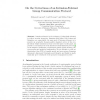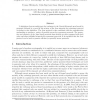135 search results - page 10 / 27 » Authentication and Key Agreement Protocols Preserving Anonym... |
CHARME
2003
Springer
14 years 29 days ago
2003
Springer
Intrusion-tolerance is the technique of using fault-tolerance to achieve security properties. Assuming that faults, both benign and Byzantine, are unavoidable, the main goal of Int...
INDOCRYPT
2004
Springer
14 years 1 months ago
2004
Springer
A definition of secure multi-party key exchange in the Canetti-Krawczyk proof model is proposed, followed by a proof of the security of the Joux tripartite key agreement protocol...
JUCS
2008
13 years 7 months ago
2008
Unknown Key-Share (UKS) resilience is a basic security attribute in authenticated key agreement protocols, whereby two entities A and B should not be able to be coerced into shari...
SCN
2010
Springer
13 years 6 months ago
2010
Springer
The Canetti–Krawczyk (CK) and extended Canetti–Krawczyk (eCK) security models, are widely used to provide security arguments for key agreement protocols. We discuss security s...
CCS
2004
ACM
14 years 1 months ago
2004
ACM
This paper describes the direct anonymous attestation scheme (DAA). This scheme was adopted by the Trusted Computing Group as the method for remote authentication of a hardware mo...


